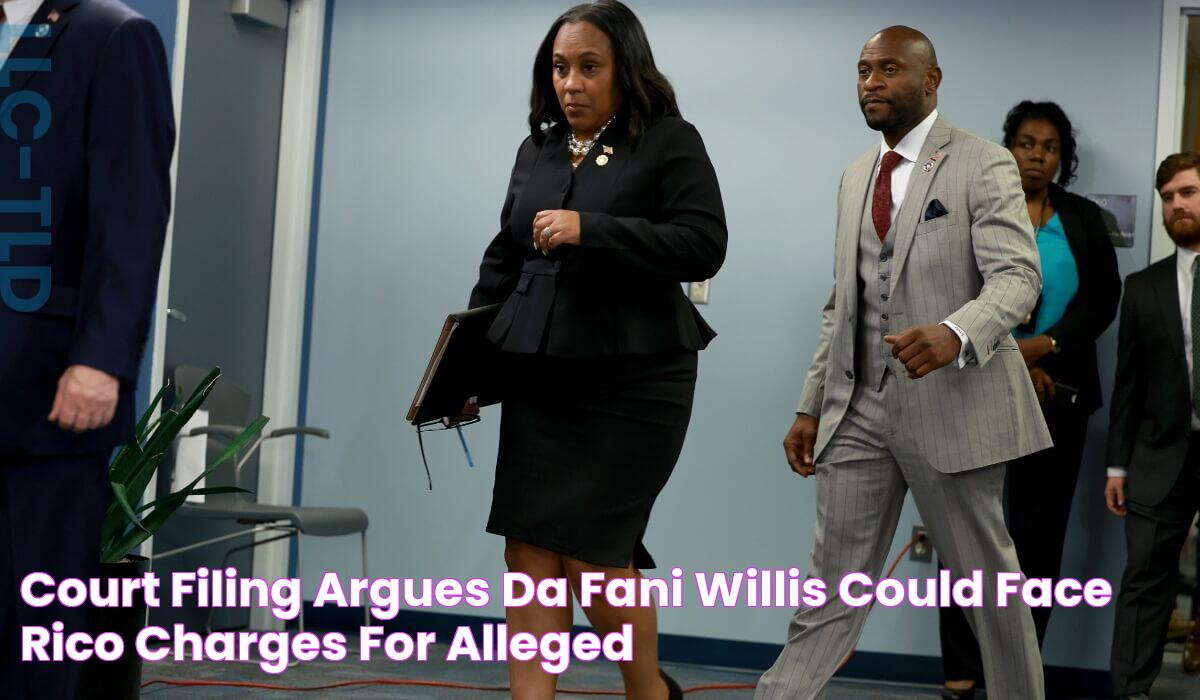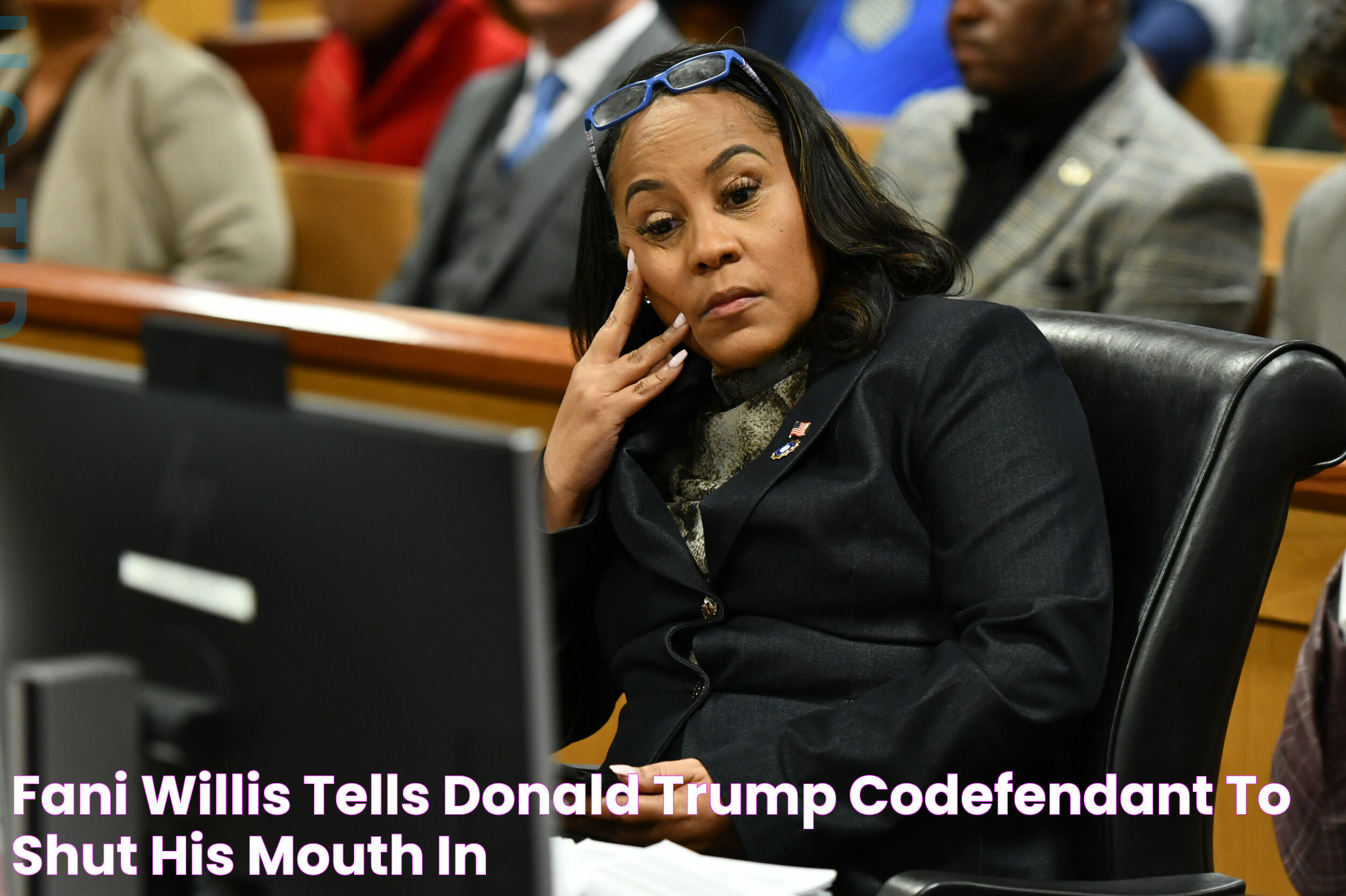A RICO case, short for Racketeer Influenced and Corrupt Organizations Act, is a type of federal lawsuit that the government can bring against individuals and organizations involved in organized crime. The Racketeer Influenced and Corrupt Organizations Act was enacted in 1970 to combat organized crime in the United States and has since been used to prosecute a wide range of criminal activities, including drug trafficking, money laundering, and racketeering.
In the recent case of "Judge Rebukes Fani Willis in RICO Case", Judge Steve C. Jones of the Northern District of Georgia issued a scathing rebuke of Fulton County District Attorney Fani Willis's handling of a RICO case against Atlanta rapper Young Thug and his associates. Judge Jones accused Willis of prosecutorial misconduct, including making false statements to the court, withholding evidence from the defense, and engaging in witness intimidation.
The judge's rebuke is a significant development in the case, which has been closely watched by legal experts and civil rights advocates. Willis has been criticized for her aggressive pursuit of the case, which some have argued is politically motivated. The judge's rebuke could lead to the dismissal of the case or the disqualification of Willis from prosecuting it.
Read also:Explore The Uncovered Truth Alana Cho Leak Scandal Unraveled
The case is still ongoing, and it is unclear what the ultimate outcome will be. However, the judge's rebuke is a clear indication that Willis's handling of the case has fallen short of the standards of professional conduct.
Judge Rebukes Fani Willis in RICO Case
The case of "Judge Rebukes Fani Willis in RICO Case" highlights several key aspects related to the legal system, prosecutorial conduct, and the rights of the accused.
- RICO: The Racketeer Influenced and Corrupt Organizations Act is a federal law that allows prosecutors to bring charges against individuals and organizations involved in organized crime.
- Prosecutorial Misconduct: Judge Jones accused Willis of engaging in prosecutorial misconduct, including making false statements to the court, withholding evidence from the defense, and engaging in witness intimidation.
- Judicial Review: Judge Jones's rebuke is a reminder that judges have a responsibility to ensure that prosecutors are acting fairly and ethically.
- Due Process: The judge's rebuke raises concerns about whether Willis's pursuit of the case has violated the due process rights of the defendants.
- Political Motivation: Some have argued that Willis's prosecution of the case is politically motivated, which could raise further questions about her conduct.
- Fair Trial: The judge's rebuke could lead to the dismissal of the case or the disqualification of Willis from prosecuting it, which would be a significant victory for the defendants and their right to a fair trial.
These key aspects highlight the importance of due process, judicial review, and prosecutorial ethics in the criminal justice system. The case of "Judge Rebukes Fani Willis in RICO Case" is a reminder that even prosecutors are not above the law and that the rights of the accused must be protected.
1. RICO
The Racketeer Influenced and Corrupt Organizations Act (RICO) is a powerful tool that prosecutors can use to combat organized crime. RICO allows prosecutors to charge individuals and organizations with a pattern of racketeering activity, which can include a wide range of criminal offenses, such as drug trafficking, money laundering, and extortion. RICO also allows prosecutors to seek civil penalties, such as the forfeiture of assets.
In the case of "Judge Rebukes Fani Willis in RICO Case", RICO is central to the prosecution's case. Willis is alleging that Atlanta rapper Young Thug and his associates are members of a criminal enterprise that has engaged in a pattern of racketeering activity, including drug trafficking, witness intimidation, and murder.
RICO is a complex law, and it can be difficult to prove a RICO case. However, if Willis is successful in proving her case, she could obtain significant penalties against Young Thug and his associates, including lengthy prison sentences and the forfeiture of their assets.
Read also:Who Is Sean Hannitys Daughter
The case of "Judge Rebukes Fani Willis in RICO Case" is a reminder that RICO is a powerful tool that prosecutors can use to combat organized crime. RICO can be used to target a wide range of criminal activity, and it can result in significant penalties for those who are convicted.
2. Prosecutorial Misconduct
Prosecutorial misconduct is a serious issue that can undermine the integrity of the criminal justice system. When prosecutors engage in misconduct, they can deprive defendants of their due process rights and make it more difficult for them to receive a fair trial.
- Making false statements to the court: Prosecutors have a duty to be truthful to the court. When they make false statements, they can mislead the court and make it more difficult for the court to make fair and informed decisions.
- Withholding evidence from the defense: Prosecutors have a duty to disclose all evidence that is material to the case to the defense. When they withhold evidence, they can deprive the defense of the opportunity to present a complete and effective defense.
- Engaging in witness intimidation: Prosecutors have a duty to protect witnesses from intimidation and harassment. When they engage in witness intimidation, they can make it more difficult for witnesses to come forward and testify.
In the case of "Judge Rebukes Fani Willis in RICO Case", Judge Jones accused Willis of engaging in all three of these types of prosecutorial misconduct. If these allegations are true, they could have a significant impact on the case. The judge could dismiss the case, disqualify Willis from prosecuting it, or impose other sanctions.
Prosecutorial misconduct is a serious problem that can have a devastating impact on the criminal justice system. It is important to hold prosecutors accountable for their misconduct and to ensure that defendants receive a fair trial.
3. Judicial Review
In the case of "Judge Rebukes Fani Willis in RICO Case", Judge Jones's rebuke is a clear example of judicial review in action. Judicial review is the power of the courts to review the actions of other branches of government, including the executive branch. In this case, Judge Jones is reviewing the actions of the prosecutor, Fani Willis, to ensure that she is acting fairly and ethically.
- Ensuring Prosecutorial Fairness
Judges play a critical role in ensuring that prosecutors are acting fairly and ethically. They do this by reviewing the prosecutor's charging decisions, plea offers, and other actions to make sure that they are in line with the law and ethical standards.
- Preventing Prosecutorial Misconduct
Judicial review can also help to prevent prosecutorial misconduct. If a judge believes that a prosecutor has engaged in misconduct, the judge can take a variety of actions, including dismissing the case, disqualifying the prosecutor, or imposing sanctions.
- Protecting the Rights of the Accused
Judicial review is an important safeguard for the rights of the accused. By ensuring that prosecutors are acting fairly and ethically, judges are helping to ensure that the accused receive a fair trial.
- Maintaining Public Confidence in the Criminal Justice System
Judicial review also helps to maintain public confidence in the criminal justice system. When judges hold prosecutors accountable for their misconduct, it sends a message that the system is fair and that no one is above the law.
Judge Jones's rebuke in "Judge Rebukes Fani Willis in RICO Case" is a reminder that judicial review is an essential component of the criminal justice system. By ensuring that prosecutors are acting fairly and ethically, judges are helping to protect the rights of the accused and maintain public confidence in the system.
4. Due Process
Due process is a fundamental principle of the American criminal justice system. It guarantees that all persons accused of a crime are treated fairly and that their rights are protected. Due process rights include the right to a fair trial, the right to an attorney, and the right to be free from cruel and unusual punishment.
In the case of "Judge Rebukes Fani Willis in RICO Case", Judge Jones's rebuke raises concerns about whether Willis's pursuit of the case has violated the due process rights of the defendants. Judge Jones accused Willis of prosecutorial misconduct, including making false statements to the court, withholding evidence from the defense, and engaging in witness intimidation. These allegations, if true, could have a significant impact on the fairness of the trial.
For example, if Willis withheld evidence from the defense, the defendants would not have been able to present a complete and effective defense. This could have led to a wrongful conviction.
Judge Jones's rebuke is a reminder that prosecutors have a duty to act fairly and ethically. When prosecutors engage in misconduct, they can deprive defendants of their due process rights and make it more difficult for them to receive a fair trial.
The case of "Judge Rebukes Fani Willis in RICO Case" is a reminder that due process is an essential component of the criminal justice system. Due process rights protect the innocent from wrongful convictions and ensure that all persons accused of a crime are treated fairly.
5. Political Motivation
The connection between political motivation and prosecutorial conduct is a complex and controversial one. Some have argued that prosecutors should never consider political factors when making charging decisions. Others argue that political considerations are sometimes necessary to ensure that the criminal justice system is fair and equitable.
- The Appearance of Impropriety
One of the main concerns about political motivation in prosecutorial decisions is the appearance of impropriety. When a prosecutor is seen as being politically motivated, it can undermine public confidence in the criminal justice system. This is especially true in cases involving high-profile defendants or politically sensitive issues.
- Selective Prosecution
Another concern about political motivation is that it can lead to selective prosecution. This occurs when a prosecutor brings charges against a particular individual or group for political reasons, rather than because there is a legitimate basis for doing so. Selective prosecution can be a serious violation of due process rights.
- The Chilling Effect
Political motivation can also have a chilling effect on free speech and political activism. If people believe that they may be prosecuted for their political beliefs or activities, they may be less likely to speak out or participate in the political process.
- The Need for Accountability
Despite the concerns about political motivation, it is important to remember that prosecutors are elected officials who are accountable to the public. This means that they have a responsibility to consider the political consequences of their decisions. However, this does not mean that they should make charging decisions based solely on political expediency.
In the case of "Judge Rebukes Fani Willis in RICO Case", the allegations of political motivation raise serious concerns about the fairness of the prosecution. If Willis is found to have engaged in political motivation, it could lead to the dismissal of the case or the disqualification of Willis from prosecuting it.
6. Fair Trial
The right to a fair trial is a fundamental principle of the American criminal justice system. It guarantees that all persons accused of a crime are treated fairly and that their rights are protected. A fair trial includes the right to an impartial jury, the right to be represented by an attorney, and the right to present a defense.
In the case of "Judge Rebukes Fani Willis in RICO Case", the judge's rebuke raises serious concerns about whether the defendants are receiving a fair trial. The judge accused Willis of prosecutorial misconduct, including making false statements to the court, withholding evidence from the defense, and engaging in witness intimidation. These allegations, if true, could have a significant impact on the fairness of the trial.
For example, if Willis withheld evidence from the defense, the defendants would not be able to present a complete and effective defense. This could lead to a wrongful conviction.
The judge's rebuke is a reminder that prosecutors have a duty to act fairly and ethically. When prosecutors engage in misconduct, they can deprive defendants of their due process rights and make it more difficult for them to receive a fair trial.
The case of "Judge Rebukes Fani Willis in RICO Case" is a reminder that the right to a fair trial is an essential component of the criminal justice system. Fair trial rights protect the innocent from wrongful convictions and ensure that all persons accused of a crime are treated fairly.
FAQs on "Judge Rebukes Fani Willis in RICO Case"
This section provides answers to frequently asked questions regarding the case of "Judge Rebukes Fani Willis in RICO Case." These questions address common concerns and misconceptions surrounding the case and aim to enhance understanding of its significance and implications.
Question 1: What is the significance of Judge Steve C. Jones' rebuke of Fani Willis in the RICO case?
Answer: Judge Jones' rebuke is highly significant as it highlights potential prosecutorial misconduct and raises concerns about the fairness of the trial. The allegations against Willis, including making false statements, withholding evidence, and witness intimidation, could lead to the dismissal of the case or Willis's disqualification as the prosecutor, ensuring that the defendants' rights to a fair trial are protected.
Question 2: What are the implications of the judge's rebuke for the RICO case against Young Thug and his associates?
Answer: The judge's rebuke has far-reaching implications for the RICO case. If the allegations of prosecutorial misconduct are substantiated, the defendants could have grounds for a mistrial or even the dismissal of the case. Furthermore, the rebuke raises questions about the credibility of the prosecution's evidence and the fairness of the proceedings, potentially weakening the case against Young Thug and his associates.
Question 3: How does the case relate to the broader issue of prosecutorial misconduct?
Answer: The case of "Judge Rebukes Fani Willis in RICO Case" brings the issue of prosecutorial misconduct to the forefront. It highlights the importance of ensuring that prosecutors act ethically and within the bounds of the law. Prosecutorial misconduct can undermine the integrity of the criminal justice system and erode public trust in the fairness of trials.
Question 4: What are the potential consequences for Fani Willis if the allegations of misconduct are proven?
Answer: If the allegations of prosecutorial misconduct against Fani Willis are proven, she could face severe consequences. The judge may dismiss the case, disqualify her from prosecuting it, or impose other sanctions. Additionally, Willis could face disciplinary action from the State Bar of Georgia, potentially jeopardizing her ability to practice law.
Question 5: What is the significance of the case for the American criminal justice system?
Answer: The case of "Judge Rebukes Fani Willis in RICO Case" serves as a reminder of the importance of due process, judicial review, and prosecutorial ethics in the American criminal justice system. It emphasizes the need for judges to act as impartial arbiters and for prosecutors to adhere to the highest ethical standards. The case highlights the safeguards in place to protect the rights of the accused and ensure the fairness of trials.
Summary of key takeaways or final thought:
The case of "Judge Rebukes Fani Willis in RICO Case" underscores the critical role of judges in ensuring prosecutorial fairness and protecting the rights of the accused. It serves as a reminder that prosecutors must act ethically and within the bounds of the law to maintain public trust in the criminal justice system.
Transition to the next article section:
This concludes the FAQs on "Judge Rebukes Fani Willis in RICO Case." For further insights and analysis on this and related topics, please explore the rest of our comprehensive coverage.
Conclusion
The case of "Judge Rebukes Fani Willis in RICO Case" has brought to light serious concerns regarding prosecutorial misconduct and the right to a fair trial. Judge Steve C. Jones' rebuke of Fani Willis highlights the importance of judicial oversight and the need for prosecutors to adhere to ethical standards.
This case serves as a reminder that prosecutors must act with integrity and fairness to maintain public trust in the criminal justice system. The allegations against Willis, if proven, could have far-reaching implications for the RICO case against Young Thug and his associates. It is essential that the rights of the accused are protected, and that all parties involved in the criminal justice system are held accountable for their actions.


